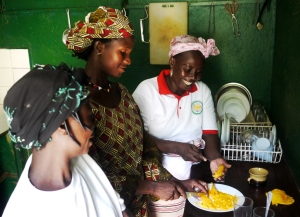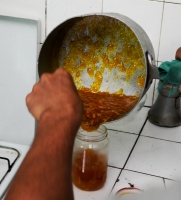The only good thing about hot season in Burkina is that it’s also mango season. The so called ‘king of fruits’ is sold at practically every stand in town, and makes the burden of living in 115 degree heat a little more manageable. It’s a slightly messy affair, but once I learned how to properly prepare them I’ve been eating at least one per day. Mango season, which starts in early April, will generally run through August, so I still have plenty of time to enjoy my new obsession. But after August how will I cope with a sudden loss of my favorite fruit?
Mango jam, that’s how. Jam is surprisingly easy to make, and just has two ingredients: mangos and sugar. Plus, if you can round up some glass jars you can store the jam for six months to a year. It’s so easy to make in fact, that making my own jam will be something that I continue back in the US. Sadly there aren’t many options here for experimenting with flavor combinations, but in the US it’s a breeze to make a custom jam with whatever fruits suit your fancy; mango/raspberry/strawberry combination anyone?
My only real option for experimentation is with a few mildly different types of mangos. For example, my new favorite, the reddish/yellow mangos, are much sweeter than the typical yellow mango. They are almost like a cross between pineapples and mangos, with the part closest to the skin similar in color and texture to a pineapple. By adding the less ripe green mango, I can also experiment with the thickening the jam.
The finished product is surprisingly versatile. Lately, I’ve enjoyed:
- Peanut butter and jelly sandwiches
- Fruit yogurt
- Bread with butter and jam
- Gateau, or local pastries, with jam
Ok, so I’ve convinced you that making jam is a fun thing to do, and tasty. But in the context of Burkina, it’s a great product to introduce into the community to sell. In many parts of the country, mangos are so abundant that they only cost about $0.10 (50 CFA) each, and can be essentially free if you happen to have a few trees on your property. And since commercial jam is normally sold for around $1.55 to $2.67 (700-1200 CFA), and you only need two mangos for each jar, the profit margins for locally made jam can be absurdly high.
Our test jar, which can be sold for around 500-600 CFA only cost 300 CFA to produce (100 CFA for two mangos and 200 CFA of sugar). Though if you plan on making in large quantities you’ll have to find a supply of glass jars. The head of the local woman’s association here thinks that she’ll be able to get some for free, while having to pay 25-50 CFA for others. Startup costs are low, and most people already have all of the necessary equipment. It’s also a good gateway to teaching general business, accounting, and computer skills once the business matures.
Ingredients: Mangos, sugar
Preparation:
- Finely dice mangos.
- Measure out sugar. 2 parts mango to 1 part sugar. Or 3:2 if you have a sweet tooth.
- Sauté mangos for 5 minutes on low to mid heat while stirring.
- Slowly add sugar for the following 10 minutes while stirring.
- Continue to stir and allow the jam to congeal for 20-30 additional minutes.
- Pour into a sterilized (just boil for 10 minutes) glass container with metal lid (also sterilized).
- If you plan to store the jam, put on the metal lid but do not tighten quite all of the way. Place the full jar of jam into boiling water (with water fully covering the jar). After about 10 minutes, the cap will depress, signaling that all of the air has been removed from the jar.












Thanks for sharing the recipe. I might just try this at home!
So when you get back to the states, I fully expect you to have worked out the logistics and economies so that within 6 months of your return, I can buy a jar of fair trade Burkinabe mango jam at Whole Foods for $5. And thanks for the recipe, we’ll have to try it.